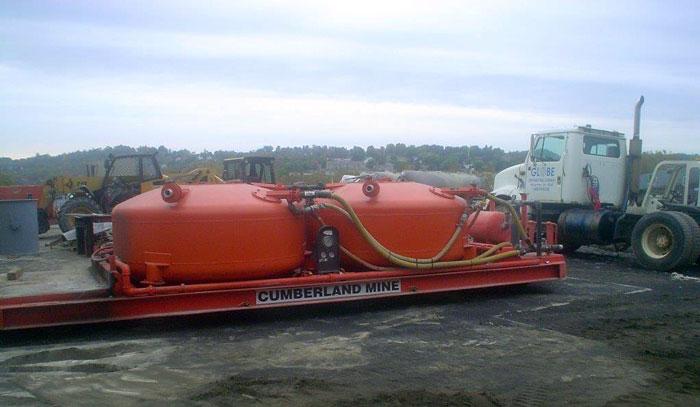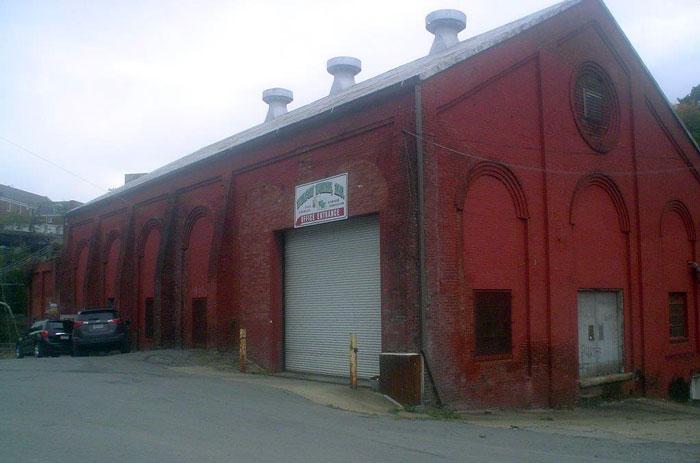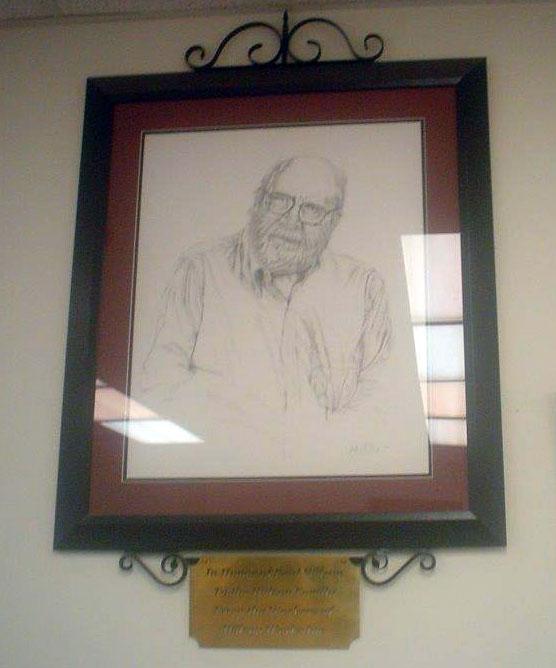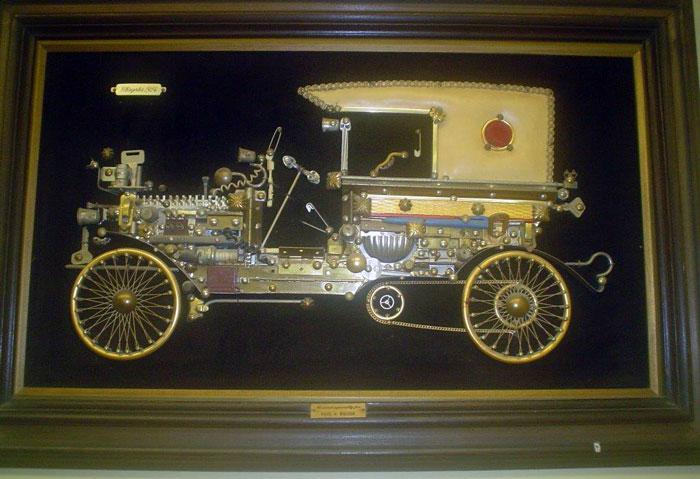AWS CWI, CWE, NDE Level III
- FMA
- The Fabricator
- FABTECH
- Canadian Metalworking
Categories
- Additive Manufacturing
- Aluminum Welding
- Arc Welding
- Assembly and Joining
- Automation and Robotics
- Bending and Forming
- Consumables
- Cutting and Weld Prep
- Electric Vehicles
- En Español
- Finishing
- Hydroforming
- Laser Cutting
- Laser Welding
- Machining
- Manufacturing Software
- Materials Handling
- Metals/Materials
- Oxyfuel Cutting
- Plasma Cutting
- Power Tools
- Punching and Other Holemaking
- Roll Forming
- Safety
- Sawing
- Shearing
- Shop Management
- Testing and Measuring
- Tube and Pipe Fabrication
- Tube and Pipe Production
- Waterjet Cutting
Industry Directory
Webcasts
Podcasts
FAB 40
Advertise
Subscribe
Account Login
Search
Upsizing in a downsizing economy
Portrait of a growing shop
- By Professor R. Carlisle "Carl" Smith
- November 25, 2014
- Article
- Shop Management
The WVU football team is not the only thing that is progressing in Morgantown, W.V. (The team has progressed from a mediocre season in 2013 to No. 23 in the sportswriters' poll.) A Morgantown company, Wilson Works, has grown from a very small operation by the river (Figure 1) to a nationally known organization.
Then
In the early days Wilson Works performed jobs mostly for local companies. Because of limited space, the items it fabricated could not be very large. Crane capacity also was a limiting factor.
Only a few parking spaces were available, and "no parking, or you will be towed" signs were present.
The office consisted of one room at the front of the shop, which employed 11 people, including the management.
Even with its limitations, the shop was able to turn out quality work, on time. No job was too small or too complicated. The shop's reputation was built on these principles.
Paul Wilson (Figure 2) was the owner and manager at the original location. He had a reputation as a mechanical guru and could make something out of anything. Figure 3 is an example of one of his personal projects, a touring coach. Parts were gathered together from several pockets of items and meticulously mated to make this beautiful piece of art.
At one point Wilson attempted to merge with another company that had equipment capable of performing larger fabrications. Even with the more versatile equipment, this endeavor did not last long, because the other company's philosophy (for personnel and other concepts) did not mesh well with that of Wilson Works.
When Wilson decided to retire, his grandson Troy Woodall assumed the managerial position. Woodall had worked with his grandfather in the old shop as a youngster. He joined the Navy and gained expertise in electronics, among other skills. He has the same attitude as Wilson concerning the "no job is too small or too complicated" philosophy. He has added "no job is too large."
Woodall makes sales calls, does job estimating, works up fabrication procedures, and, on occasion, actually performs some of the work. It is not uncommon to find him in the field gathering information for a job, and he may even be seen down inside a coal mine. He touches every part of the business.
Even as busy as he is, Woodall finds time to throw a luncheon party at the end of a big job that has required the employees to work overtime and weekends. This is probably the reason for the low turnover in his workforce. Nearly all of the personnel that worked for Wilson still work for Woodall, except those who have retired. Retirees also have a special party to which their families and friends are invited. The workers have no doubt that they are deeply appreciated. (I have worked with the company since the 1990s and have never yet heard a negative remark from the employees about the management.)
Now
Wilson Works Inc. now has the capacity, equipment, and skilled workforce to perform nearly any type of fabricating. The new shop (Figure 4) is about 10 times larger than the old shop. It has enough parking for all the employees and customers, and the tow-away signs are nonexistent.
The part of the building shown in Figure 5 that is just in front of the parking area is dedicated to the engineering department. The area shown takes up about one-tenth of the length of the shop, which has a total area of 68,000 square feet.
The company is in the process of constructing a 14,000-sq.-ft area for ASME code work.
Upsizing
In contrast to my previous article, "Downsizing can be a killer," Wilson Works has not cut back on manpower or anything else. The rumors of the death of coal did not hinder this company's forward progress. When everyone else decided not to work with the coal industry, Wilson Works picked up the slack and now is doing more coal mine equipment work than ever before.
Now that the company has acquired ASME and National Board authorization for fabrication, alterations, and repairs, it is able to do pressure vessel work for the mines (Figure 6). It also can rebuild mine locomotives with all the hydraulics, electrical, and mechanical tasks that are required to bring the equipment up to standards.
Woodall's familiarity with the mining industry has placed the company in a position to capture an increasing amount of coal company work. It has hired personnel who have experience with some of the largest coal equipment manufacturers in the country. Some are hydraulic specialists and others are electrical and mechanical specialists in mining equipment. Having this expertise has helped the company avoid the undesirable downsizing that has become the norm for many businesses located in the coal states.
In my downsizing article, I referenced letting go of older, more experienced personnel. Wilson Works does not adhere to this practice at all. Along with hiring and training new engineers and shop workers, the company has retained the original workforce. No one leaves until they decide to retire. Woodall does not retire them.
The chief maintenance man in the shop has long passed retirement age but still works full-time. "Uncle Foster" (Figure 7) knows more about the shop equipment than anyone there. He is capable of repairing nearly any machine in the shop. He also assists and trains the younger workers in the use of press brakes and other benders. The workers are more than willing to listen to his valuable advice.
Fieldwork
Wilson Works has an experienced field crew for fabrication, repair, and alteration. The field workforce consists of workers who have been with the company for many years. Another example of upsizing is that the size of the field crew has increased with the seemingly unlimited growth of the business.
The equipment required to accomplish fieldwork has been updated to accommodate the customers' needs. New trucks capable of handling welding equipment, air compressors, and lifting devices are now in use (Figure 8). In addition to these trucks, the company has all-wheel-drive crew cab pickup trucks that pull trailers loaded with field tools. These trailers have pull-out awnings for use in inclement weather.
The company's code authorization allows it to perform code work in the field. Small code repairs can easily be performed with the portable equipment that is contained in either the service trucks or trailers.
Shop Capabilities
Some of the equipment in Wilson Works' shop is almost exclusive to the area. Its two waterjet cutting machines (Figure 9) can cut materials thicker than those that can be cut with plasma. The tables are large enough to cut full sheets of material, and the cut accuracy is almost unbelievable. In many cases, the waterjet is used in lieu of a more time-consuming machining process. Even materials down in the 20-gauge thicknesses can be cut as accurately as greater thicknesses on the waterjets.
The shop also has large and small CNC machines in addition to a trove of conventional machines. Another exclusive is a 600-ton press that can move almost any stuck bearing or wheel on a shaft. Capable of shaking the building when used at full capacity, this press is essential for mining industry work. Equipment in industries such as the limestone quarries and cement plants has bearings and gears that become frozen on the shafts from lime powder, which ruins the lubrication medium and causes overheating.
Relationships
Another angle that Woodall has taken is establishing a relationship with a nearby engineering firm that can produce drawings and specifications quickly and efficiently for larger jobs. This leaves the in-house engineers time to do detailing and bills of material for the many smaller jobs that are called in daily. While the in-house engineers are more than capable of handling large jobs, it is better for business not to tie them up with long-term drawings.
One in-house engineer who has been with the company for many years is Rusty Wise. Woodall said that Wise is a very good draftsman, but is more valuable in processing sales documents and placing purchase orders with the vendors. He has excellent relationships with nearly all of the company's vendors and is able to acquire materials at the best cost and delivery time.
A Year of Accomplishment
2014 has been a year of outstanding accomplishments for Wilson Works. Not only has the company expanded its shop and field capabilities, it also has obtained long-awaited and needed Certificates of Authorization for the ASME and National Board fired and unfired pressure vessels and piping. After years of preparation and planning, it now is authorized to construct pressure vessels and piping systems and to alter and repair them.
An established relationship with Hartford Steam Boiler as its Authorized Inspection Agency means the company no longer has to farm out the pressure vessel jobs for shop and field contracts. It is authorized to perform work on such items as heat exchangers, boiler tubes, tube sheets, air compressor receivers, hydraulic reservoirs, and other pressure-related items.
Wilson Works has established relationships with some of the most prominent companies in the nation and even some international companies. For fear of slighting someone, I am listing a few that I am sure most people in the fabricating industry recognize: Foster Wheeler, Siemens, Babcock and Wilcox, General Electric, Mylan Pharmaceutical, ABB, and the Army Corps of Engineers.
There is no doubt in my mind that Wilson Works is the most progressive organization in our state and possibly in the whole Mid-Atlantic fabrication industry. It achieved this status not by downsizing, but by investing in people and equipment and capitalizing on opportunity.
About the Author

Professor R. Carlisle "Carl" Smith
Weld Inspection & Consulting
PO Box 841
St. Albans, WV 25177
304-549-5606
subscribe now

The Fabricator is North America's leading magazine for the metal forming and fabricating industry. The magazine delivers the news, technical articles, and case histories that enable fabricators to do their jobs more efficiently. The Fabricator has served the industry since 1970.
start your free subscription- Stay connected from anywhere

Easily access valuable industry resources now with full access to the digital edition of The Fabricator.

Easily access valuable industry resources now with full access to the digital edition of The Welder.

Easily access valuable industry resources now with full access to the digital edition of The Tube and Pipe Journal.
- Podcasting
- Podcast:
- The Fabricator Podcast
- Published:
- 04/16/2024
- Running Time:
- 63:29
In this episode of The Fabricator Podcast, Caleb Chamberlain, co-founder and CEO of OSH Cut, discusses his company’s...
- Trending Articles
Tips for creating sheet metal tubes with perforations

JM Steel triples capacity for solar energy projects at Pennsylvania facility

Are two heads better than one in fiber laser cutting?

Supporting the metal fabricating industry through FMA

Omco Solar opens second Alabama manufacturing facility

- Industry Events
16th Annual Safety Conference
- April 30 - May 1, 2024
- Elgin,
Pipe and Tube Conference
- May 21 - 22, 2024
- Omaha, NE
World-Class Roll Forming Workshop
- June 5 - 6, 2024
- Louisville, KY
Advanced Laser Application Workshop
- June 25 - 27, 2024
- Novi, MI






























